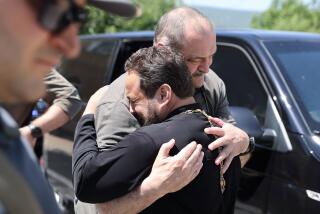Dagestan suicide bombings kill 12
- Share via
Reporting from Moscow — Double suicide bombings struck the strife-ridden Russian republic of Dagestan on Wednesday, killing 12 people and injuring dozens.
The attacks came as a violent echo of this week’s bombings in Moscow’s subway system, which left 39 dead and stirred fear that volatility in Russia’s mostly Muslim Caucasus region is again seeping deep into the rest of the country.
A Chechen militant leader claimed responsibility for the subway bombings in a statement released Wednesday to a website affiliated with the militants. Doku Umarov, who calls himself the “Emir of the Caucasus” and advocates the creation of an Islamic state in the mountain region, pledged to continue attacks on Russian cities.
Russian Prime Minister Vladimir Putin again lashed out at militant groups, and called for reinforcement of police ranks in the north Caucasus.
“I don’t rule out that the same terrorists were involved,” Putin told a government presidium in Moscow. “It does not matter for us in what part of the country these crimes have been committed, or who -- people of what ethnicity or religion -- have fallen victim to these crimes.
“We see this as a crime against Russia.”
Wednesday morning’s first bombing was on Lenin Road in Kizlyar, near the Dagestani border with Chechnya.
The driver of a Russian-made off-road vehicle ignored the commands of a police patrol to pull over, Russian Interior Minister Rashid Nurgaliyev said. As the police sped closer to the explosives-packed car, the driver detonated it.
Once medical teams and additional law enforcement officers had rushed to the scene, a man in a police uniform walked into a group of officers standing near an ambulance and blew himself up. Witnesses said his head shot straight into the air after the blast and then lay on the ground.
At least seven of the dead were police officers, including the district police chief.
The bombers chose a stretch of road close to the Interior Ministry, Federal Security Services and the FSB, the modern-day successor to the KGB. The windows of a nearby school were shattered and its roof collapsed from the force of the blast. No children were inside at the time.
Nurgaliyev, the interior minister, told reporters that it is “important to increase vigilance at police departments and executive and legislative government bodies.”
Violence has been grinding along for years in the Caucasus, sometimes drifting from one republic to the next with little public attention. Since the Moscow bombings Monday, skirmishes have also erupted in Chechnya, and insurgents operating from a forest in Dagestan attacked a group of police officers.
But it is the subway attacks that have focused renewed national attention on the country’s volatile southern edge. The women who blew themselves up on the subway are believed to have traveled to the capital from the Caucasus.
“The explosions on the Moscow Metro and today’s explosions in Kizlyar are links of the same chain,” Dagestani President Magomedsalam Magomedov told reporters. “These people do not need peace. They want war.”
Hard-line Islamic sentiment is growing in Dagestan, said Zaur Gaziyev, a representative of the Memorial human rights group in the republic, and people are becoming used to living amid violence. At the same time, despair is rising, he added, noting that his organization is documenting many incidents of kidnapping, torture and extrajudicial execution at the hands of the police.
“People are more afraid of the police than they are of gangsters, bandits or terrorists,” Gaziyev said. “I can describe it in one word: hatred. Just plain hatred.”
Not that the militants are any better, he added hastily.
“They are just religious fanatics,” he said. “We understand that if, God forbid, they come to power, the first people they will lead to the slaughter or, at best, expel from the republic, will be the human rights activists who did their best to protect their rights.”
Early Wednesday evening, hundreds of members of pro-Kremlin youth groups crowded Moscow’s Triumfalnaya Square to protest the attacks. Rappers and pop stars performed for the crowd on a stage adorned with the slogan “Generation Against Terrorism,” and under a white tent, blood donations were collected.
The gathering took place at a time when anti-Putin forces had long planned an unsanctioned demonstration in the same square. After Monday’s attack, most of the opposition leaders announced that they would, instead, visit the bombed subway stations to place flowers at the makeshift memorials that have sprung up.
About 2,000 riot police officers and Interior Ministry troops ringed the square in case any anti-government demonstrators turned up anyway. A few came, clutching signs that read “Depriving people of their rights creates terror” or passing out leaflets suggesting that Russian intelligence was behind the subway bombings.
Police later said they had arrested 10 protesters.
“Every time there’s a terrorist attack, authorities take advantage of it to attack activists,” said Lev Ponomaryov, head of the group For Human Rights.
Moscow authorities issued their own statement condemning the protesters for “trying to destabilize the situation in Moscow during these tragic days.”
Later, when one of Russia’s most respected human rights activists, Lyudmila Alexeyeva, 82, laid flowers at Park Kultury Metro station, a young man came forward and hit her on the head.
More to Read
Sign up for Essential California
The most important California stories and recommendations in your inbox every morning.
You may occasionally receive promotional content from the Los Angeles Times.










